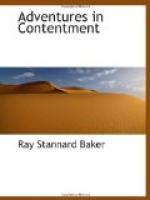“Now I say,” said the Scotch Preacher, “that it makes me want to go fishing.”
“That,” I said, “is true of every great book: it either makes us want to do things, to go fishing, or fight harder or endure more patiently—or it takes us out of ourselves and beguiles us for a time with the friendship of completer lives than our own.”
The great books indeed have in them the burning fire of life;
.... “nay, they do preserve, as in a violl, the purest efficacie and extraction of that living intellect that bred them. I know they are as lively, and as vigorously productive, as those fabulous Dragon’s teeth; which being sown up and down, may chance to spring up armed men.”
How soon we come to distinguish the books of the mere writers from the books of real men! For true literature, like happiness, is ever a by-product; it is the half-conscious expression of a man greatly engaged in some other undertaking; it is the song of one working. There is something inevitable, unrestrainable about the great books; they seemed to come despite the author. “I could not sleep,” says the poet Horace, “for the pressure of unwritten poetry.” Dante said of his books that they “made him lean for many days.” I have heard people say of a writer in explanation of his success:
“Oh, well, he has the literary knack.”
It is not so! Nothing is further from the truth. He writes well not chiefly because he is interested in writing, or because he possesses any especial knack, but because he is more profoundly, vividly interested in the activities of life and he tells about them—over his shoulder. For writing, like farming, is ever a tool, not an end.
How the great one-book men remain with us! I can see Marcus Aurelius sitting in his camps among the far barbarians writing out the reflections of a busy life. I see William Penn engaged in great undertakings, setting down “Some of the Fruits of Solitude,” and Abraham Lincoln striking, in the hasty paragraphs written for his speeches, one of the highest notes in our American literature.
* * * * *
“David?”
“Yes, Harriet.”
“I am going up now; it is very late.”
“Yes.”
“You will bank the fire and see that the doors are locked?”
“Yes.”
After a pause: “And, David, I didn’t mean—about the story you read. Did the Knight finally kill the lions?”
“No,” I said with sobriety, “it was not finally necessary.”
“But I thought he set out to kill them.”
“He did; but he proved his valour without doing it.”
Harriet paused, made as if to speak again, but did not do so.
“Valour”—I began in my hortatory tone, seeing a fair opening, but at the look in her eye I immediately desisted.
“You won’t stay up late?” she warned.
“N-o,” I said.




